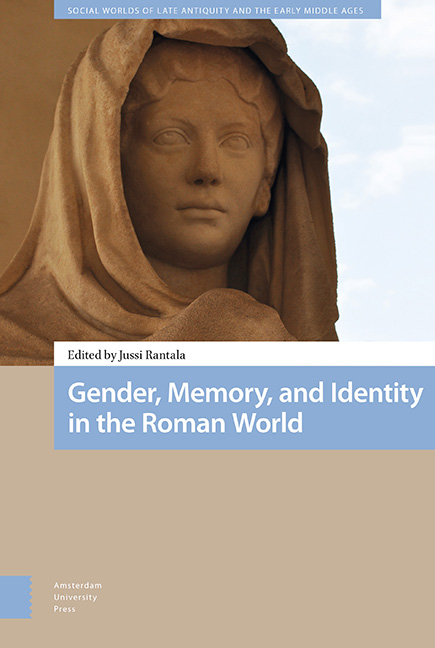Book contents
- Frontmatter
- Contents
- List of Illustrations
- Abbreviations
- Preface
- Tabula Gratulatoria
- Introduction
- 1 Public Agency of Women in the Later Roman World
- 2 Religious Agency and Civic Identity of Women in Ancient Ostia
- 3 The Invisible Women of Roman Agrarian Work and Economy
- 4 ‘Show them that You are Marcus’s Daughter’
- 5 Defining Manliness, Constructing Identities
- 6 ‘At the Age of Nineteen’ (RG 1)
- 7 Conflict and Community
- 8 Dress, Identity, Cultural Memory
- 9 The Goddess and the Town
- 10 Varius, multiplex, multiformis – Greek, Roman, Panhellenic
- 11 Mental Hospitals in Pre-Modern Society
- Index
Introduction
Published online by Cambridge University Press: 20 November 2020
- Frontmatter
- Contents
- List of Illustrations
- Abbreviations
- Preface
- Tabula Gratulatoria
- Introduction
- 1 Public Agency of Women in the Later Roman World
- 2 Religious Agency and Civic Identity of Women in Ancient Ostia
- 3 The Invisible Women of Roman Agrarian Work and Economy
- 4 ‘Show them that You are Marcus’s Daughter’
- 5 Defining Manliness, Constructing Identities
- 6 ‘At the Age of Nineteen’ (RG 1)
- 7 Conflict and Community
- 8 Dress, Identity, Cultural Memory
- 9 The Goddess and the Town
- 10 Varius, multiplex, multiformis – Greek, Roman, Panhellenic
- 11 Mental Hospitals in Pre-Modern Society
- Index
Summary
Cultural identity has become a much-discussed topic among ancient historians, particularly from the 1990s onwards. As we can notice from previous research, there is no straightforward answer to the question, ‘what is identity’; in fact, it is practically impossible to define such an abstract concept as ‘identity’ empirically. However, in social and cultural studies, definitions of course can – and should be – attempted. One means to understanding identify is to define it as ‘an abstract concept associated with the loyalty of an individual to a larger group, based on cultural, national, political, sexual, or other similar grounds’. Likewise, both collective and individual identities can be seen as ‘ascribed or negotiated characteristics which a person or group is agreed to possess’. We can perhaps draw from different definitions a conclusion that identity is a concept which describes how individuals or groups understand themselves as unique entities, separated from other individuals and/or groups. Culturally, this requires shared values, a ‘set of assumptions and experiences […] expressed by following certain common practices or by employing accepted representations of mutual identity’.
However, perhaps an even more important observation is that identity is not a fixed concept. This is the widely recognized norm in modern study, and deservedly so. People are constantly evaluating and re-evaluating their identities. While this process can take place in everyday life, it is particularly topical in times of crisis – collective or personal – or during other significant cultural, social, and political changes, or interference or influence from other individuals or groups, or other occasions as such. Moreover, while we may admit that it is entirely possible for an individual or a group to have one overarching identity, one that goes above all others in significance for her/him/them, there still is a large number of ‘sub-identities’ that exist. These are separate, sometimes changing, and even contradictory, emphasized in different ways during different times – often depending on context or where the individuals or groups are acting and evaluating themselves. As a result, identity can be seen as a discourse – both at an individual and collective level.
- Type
- Chapter
- Information
- Gender, Memory, and Identity in the Roman World , pp. 19 - 40Publisher: Amsterdam University PressPrint publication year: 2019



